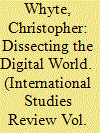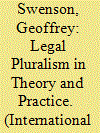|
|
|
Sort Order |
|
|
|
Items / Page
|
|
|
|
|
|
|
| Srl | Item |
| 1 |
ID:
161743


|
|
|
|
|
| Summary/Abstract |
Extending cue theory and arguments about heuristics, in this article we argue that in the European Union (EU) member states, trust in the EU acts as a proxy for trust in the United Nations. While existing studies have shown that citizens take cues from national political institutions in order to form an opinion about institutions at the transnational and international level, this study illuminates why and shows how the same is done from the EU to the international level. It further shows that the less politically aware citizens are, the more likely they are to use the EU as a proxy for assessing institutional structures at the international level. The findings suggest that the sociological legitimacy of international organizations should be assessed in a more nuanced manner that takes into consideration regional institutions. This is a methodologically instructive paper, drawing on several waves of the European Social Survey and additionally employing an elaborate replication design, confirming our main findings using empirical data from four international studies, with alternative question wordings, different question order, and different response formats.
|
|
|
|
|
|
|
|
|
|
|
|
|
|
|
|
| 2 |
ID:
161745


|
|
|
|
|
| Summary/Abstract |
Though focused on realizing markedly different analytic outcomes, each of the four books under review here approaches the task of balancing the technological ramifications of advancing digital developments against the implications of relevant sociopolitical context with a reasonable degree of success. Taken together, the books present several significant messages not only about prospects for cyber conflict but also about the aims and imperatives of the burgeoning cyberpolitics research program. In particular, these volumes do a great deal to move the discussion on cyberspace and interstate conflict beyond the bounds of traditional IR theories by demonstrating that the use of assumptions about the predigital world can constrain analytic attempts to understand the parameters of political phenomena in the digital age. Applied too strictly, some assumptions can lead to biased conclusions and overstated predictions, which in turn can have serious policy consequences. Moving forward, IR scholars face the serious task of reevaluating basic conceptual precepts and adapting them to produce new and useful models for understanding conflict, violence, and more.
|
|
|
|
|
|
|
|
|
|
|
|
|
|
|
|
| 3 |
ID:
161741


|
|
|
|
|
| Summary/Abstract |
Alexander J. Field (2014, 54) argues that game theory “offers little guidance, normatively or predictively, in thinking about behavior or strategy in a world of potential conflict.” He makes this claim by attributing to John von Neumann a view of the superpower relationship during the Cold War period that has no basis in fact and inferring policy prescriptions to that view that are simply not there. Field also suggests that Thomas Schelling's explanation of the “event that didn't occur” leads to the conclusion that “deterrence works because we are human, not because we are entirely rational” (Field 2014, 86). In this essay I show that there is at least one logically consistent game-theoretic explanation of the absence of a nuclear war during the long-peace of the 1950s and early 1960s. I also demonstrate that Field's assumptions lead to exactly the opposite conclusions; that is, that mutual deterrence can in fact be reconciled with rationality and that game theory is a powerful tool for understanding interstate conflict.
|
|
|
|
|
|
|
|
|
|
|
|
|
|
|
|
| 4 |
ID:
161738


|
|
|
|
|
| Summary/Abstract |
Previous studies suggest that patriarchal structures and rigid gender hierarchies at the societal level increase a country’s propensity for involvement in violent social and political conflict. While examining macrolevel predictors and outcomes, the arguments put forth in these studies rely heavily on theories linking individuals’ attitudes toward gender equality to individuals’ beliefs in the appropriateness of violence as a means of attaining political or social objectives. In this research, we explore the microfoundations of the gender equality–peace thesis by examining the conditional impact of beliefs about gender egalitarianism on support for the use of force to achieve foreign policy objectives. Using data from a nationally representative survey of US citizens, we find that as the strength of gender egalitarian attitudes increases, respondents’ support for the use of force to achieve traditional security objectives declines. Importantly, however, our results suggest that gender egalitarian attitudes exert the strongest suppressive effect on support for the use force among male respondents: rising gender egalitarianism among men effectively closes the gender gap in support for the use of force. Consequently, these results provide microlevel support for the relationship between gender equality and peace found in macrolevel observational analyses.
|
|
|
|
|
|
|
|
|
|
|
|
|
|
|
|
| 5 |
ID:
161744


|
|
|
|
|
| Summary/Abstract |
It is difficult to overstate the importance of the concept sovereignty for international relations (IR). And yet, understanding the historical emergence of sovereignty in international relations has long been curtailed by the all-encompassing myth of the Peace of Westphalia. While criticism of this myth has opened space for further historical inquiry in recent years, it has also raised important questions of historical interpretation and methodology relevant to IR, as applying our current conceptual framework to distant historical cases is far from unproblematic. Central among these questions is the when, what, and how of sovereignty: from when can we use “sovereignty” to analyze international politics and for which polities? Can sovereignty be used when the actors themselves did not have recourse to the terminology? And what about polities that do not have recourse to the term at all? What are the theoretical implications of applying the concept of sovereignty to early polities? From different theoretical and methodological perspectives, the contributions in this forum shed light on these questions of sovereignty and how to treat the concept analytically when applied to a period or place when/where the term did not exist as such. In doing so, this forum makes the case for a sensitivity to the historical dimension of our arguments about sovereignty—and, by extension, international relations past and present—as this holds the key to the types of claims we can make about the polities of the world and their relations.
|
|
|
|
|
|
|
|
|
|
|
|
|
|
|
|
| 6 |
ID:
161742


|
|
|
|
|
| Summary/Abstract |
Legal pluralism has vast policy and governance implications. In developing countries, for instance, non-state justice systems often handle most disputes and retain substantial autonomy and authority. Legal pluralism's importance, however, is rarely recognized and dramatically under theorized. This article advances scholarly understanding of legal pluralism both theoretically and empirically. It proposes a new typological framework for conceptualizing legal pluralism through four distinct archetypes – combative, competitive, cooperative, and complementary – to help clarify the range of relationships between state and non-state actors. It posits five main strategies used by domestic and international actors in attempts to influence the relationship between state and non-state justice systems: bridging, harmonization, incorporation, subsidization, and repression. As post-conflict situations are fluid and can feature a wide range of relationships between state and non-state actors, they are particularly instructive for showing how legal pluralism archetypes can be shifted over time. Case studies from Timor-Leste and Afghanistan highlight that selecting an appropriate policy is vital for achieving sustainable positive outcomes. Strategies that rely on large scale spending or even the use of substantial military force in isolation are unlikely to be successful. The most promising approaches are culturally intelligible and constructively engage non-state justice networks of authority and legitimacy to collectively advance the judicial state-building process. While the case studies focus on post-conflict states, the theory presented can help understand and improve efforts to promote the rule of law as well as good governance and development more broadly in all legally pluralist settings.
|
|
|
|
|
|
|
|
|
|
|
|
|
|
|
|
| 7 |
ID:
161740


|
|
|
|
|
| Summary/Abstract |
Can International Criminal Court (ICC) interventions in ongoing conflicts help curtail war crimes and civilian abuses that are being actively perpetrated? The court has increasingly intervened in such cases, partly with the intention of using its prosecutorial power to stop ongoing abuses. Yet, while much has been said about the court's potential for deterrence, little attention has been devoted to its compellent effects. Drawing on insights from the literature on coercive diplomacy, strategic bargaining, and civilian victimization, this article clarifies and critically assesses the logic of ICC compellence in cases of ongoing civilian violence. I argue that some forms of ICC intervention have compellent potential but are inherently limited. Specifically, I show why threats of prosecution, rather than actual indictments, are far more likely to be effective at curtailing violence, but also how their effective application is highly constrained by the court's own core normative principles, rules, and structures. While some see the main problem as weak enforcement—something that can be remedied with greater political will—there is a more fundamental impediment: to compel effectively, the court must carefully coordinate its actions with other states’ diplomatic and military efforts or allow itself to be used strategically by states pursuing diplomatic and military measures to curtail violence—positions that are incompatible with the court's statutory obligations and its very ethos as an independent and impartial nonstate judicial institution.
|
|
|
|
|
|
|
|
|
|
|
|
|
|
|
|
| 8 |
ID:
161739


|
|
|
|
|
| Summary/Abstract |
In pursuit of universal models and readily observable indicators, existing accounts of terrorists’ weapons adoption have privileged environmental and group-based characteristics at the expense of appreciating the fundamental, albeit sometimes idiosyncratic, role played by individuals in the weapons innovation process. This article develops in three stages an individual-centric approach to examining terrorist groups’ weapons adoption in empirical and theoretical models: first, a critical review of existing terrorist weapons adoption and innovation literature, organized into three levels of analysis—the situational, the organizational, and the individual; second, a theoretical argument—drawing on organizational learning and knowledge transfer theory—that posits individual expertise as a crucial underlying factor in terrorists’ weapons adoption; and third, a stylized case study of the Islamic State of Iraq and the Levant (ISIL)’s weapons use trends as a demonstration of the argument’s practical utility in today’s security environment. The article concludes with insights for continued scholarly inquiry into terrorist groups’ weapons adoption.
|
|
|
|
|
|
|
|
|
|
|
|
|
|
|
|
|
|
|
|
|